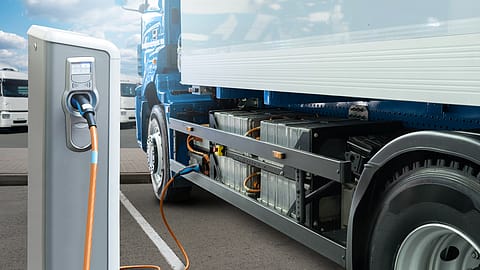India rolls out first-ever electric truck incentive scheme to drive green freight mobility
Each electric truck could receive up to ₹9.6 lakh in incentives, depending on its weight category.

The government has launched its first-ever incentive scheme for electric trucks (e-trucks), aimed at transforming the country’s freight transport sector. Spearheaded by the Ministry of Heavy Industries (MHI) under Union Minister for Heavy Industries and Steel H.D. Kumaraswamy, the initiative is part of the PM E-DRIVE programme and represents a major step towards achieving India’s net-zero emissions goal by 2070.
“This pioneering scheme represents India’s first dedicated support for electric trucks,” said Kumaraswamy. “Though diesel trucks make up just 3% of India’s vehicle population, they account for 42% of transport-related greenhouse gas emissions. This scheme will help reduce pollution, lower logistics costs, and support India’s vision of Viksit Bharat by 2047.”
The scheme provides direct financial support for N2 and N3 category e-trucks—those with a gross vehicle weight (GVW) above 3.5 tonnes. N2 includes trucks up to 12 tonnes, while N3 includes those above 12 tonnes and up to 55 tonnes. In the case of articulated vehicles, incentives apply only to the puller tractor.
Each electric truck could receive up to ₹9.6 lakh in incentives, depending on its weight category. These will be provided as an upfront discount on the purchase price and reimbursed to manufacturers on a first-come, first-served basis through the PM E-DRIVE portal.
To ensure durability and performance, electric trucks must come with manufacturer-backed warranties on the battery (5 years or 5 lakh km, whichever is earlier) and motor (5 years or 2.5 lakh km).
In addition, buyers must scrap an old, polluting truck to qualify for the incentives—ensuring the twin benefits of modernisation and reduced emissions.
The scheme aims to support the deployment of approximately 5,600 e-trucks across the country. A special allocation of ₹100 crore has been set aside for 1,100 e-trucks registered in Delhi, a region grappling with severe air pollution.
Recommended Stories
Key sectors expected to benefit include steel, cement, ports, and logistics. Leading Indian OEMs such as Tata Motors, Ashok Leyland, and Volvo Eicher are already producing electric trucks, furthering the government’s Atmanirbhar Bharat (self-reliant India) goal.
State-owned Steel Authority of India Limited (SAIL) has committed to procuring 150 e-trucks over the next two years and aims to ensure that at least 15% of all hired vehicles across its operations are electric.
Industry leaders and environmental advocates have welcomed the scheme, calling it a game-changer for clean logistics and a catalyst for India’s electric mobility ecosystem.
This incentive scheme is part of a broader push by the Indian government to build a low-carbon, sustainable transportation future. By reducing dependence on diesel trucks, the initiative is expected to significantly cut down on greenhouse gas emissions, improve urban air quality, and lower operational costs for transporters.
(INR CR)
"The incentives for e-trucks under the PM e-Drive scheme are a step forward, in the journey towards zero-emission mobility. Sustained progressive steps in this direction will be key to improving TCO and driving large-scale fleet adoption. We remain committed to work with the government and industry to accelerate clean freight movement," said Girish Wagh, executive director at Tata Motors.
As India accelerates its clean energy transition, this bold policy signals a powerful commitment to reshaping the country’s freight mobility landscape—one electric truck at a time.